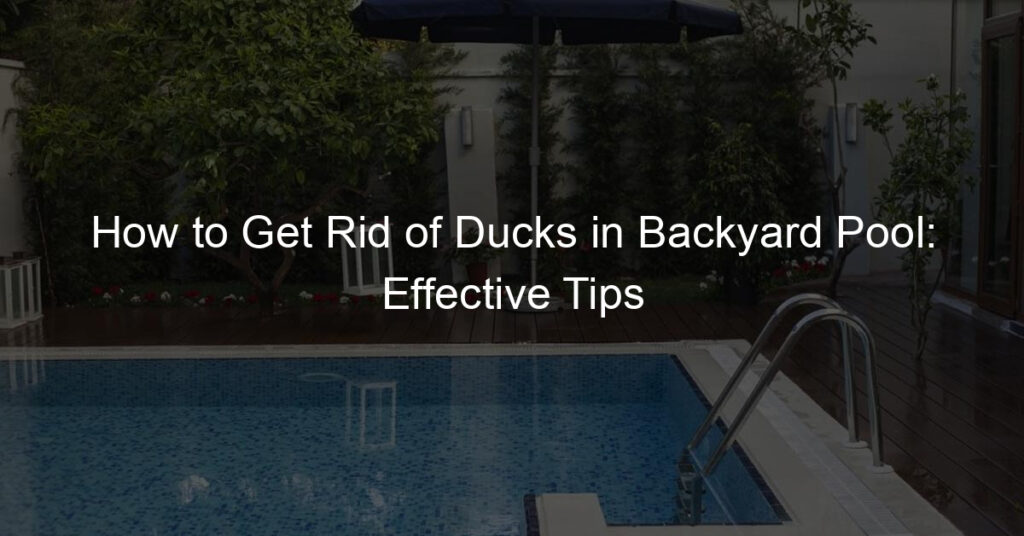Having ducks in your backyard pool can be an adorable sight, but it can also pose some problems. Besides being messy, ducks can potentially cause health risks and damage your pool’s filtration system. As a pool owner, it’s essential to find effective ways to deter these uninvited guests and ensure a clean and safe swimming environment for your family.
In this article, we will discuss various methods for discouraging ducks from turning your backyard pool into their personal pond. From physical barriers and deterrents to maintaining the surrounding area, there’s a multitude of strategies you can apply that will help keep these feathered friends at bay. By understanding the problem and implementing some of these techniques, you’ll be able to manage the situation and reclaim your pool in no time.
Key Takeaways
- Utilize deterrents such as physical barriers and noise makers to keep ducks away from your pool.
- Maintain cleanliness in both your pool and backyard to decrease the likelihood of attracting ducks.
- Consider alternative methods like solar covers, fishing lines, or pets to help deter ducks from your pool area.
Understanding the Problem
As a pool owner, I’ve encountered various issues, but one problem that can be quite troublesome is having ducks in my backyard pool. While these waterfowl may seem cute and harmless, they can create several problems for both pool maintenance and health.
Firstly, ducks tend to leave behind droppings, which not only make the pool water dirty but also increase maintenance needs, such as water filtration and chemical balance. Their droppings can even be a source of harmful bacteria, which can pose a risk to swimmers’ health.
Moreover, ducks can introduce feathers and other debris to the pool, which can also affect the pool’s water quality and make cleaning more challenging. Additionally, their presence can attract other waterfowl, leading to more significant issues.
Another important aspect to consider is the ducks’ health. Swimming in chlorinated water can be unhealthy for them, and if they decide to lay eggs near the pool, the offspring may not survive in that environment.
To sum it up, as a pool owner, I’ve learned that having ducks in my backyard pool is a problem that I need to address for the sake of my pool’s cleanliness, my health, and the well-being of the ducks themselves. It’s crucial to find a friendly and effective way to keep these birds away without causing harm to them or the environment.
Health Risks Posed by Ducks
As much as I enjoy watching ducks waddle around in my backyard, I’ve discovered that they can pose some health risks when they decide to take a dip in my pool. In particular, ducks can carry salmonella, E. coli, parasites, and other harmful bacteria, which can contaminate the pool water and potentially lead to infections or illnesses.
One of the primary concerns caused by ducks in a pool is the transmission of disease through their feces. As ducks poop while swimming, they can leave behind harmful bacteria that can negatively impact both humans and pets alike.
It’s essential to understand the risks involved and take proper measures to keep our pool area clean and safe. Some of the common pathogens found in duck poop that may concern us are:
- Salmonella: This bacteria can lead to stomach cramps, diarrhea, and fever in humans. Salmonella can be especially dangerous for young children, the elderly, and those with weakened immune systems.
- E. coli: Similar to salmonella, E. coli can cause gastrointestinal problems, such as stomach cramps, diarrhea, and even more severe health complications in some cases.
Moreover, ducks can introduce parasites into the pool, which can further lead to health issues for humans and pets. These parasites can cause skin irritation, swimmer’s itch, or even intestinal infections.
As a pool owner, I must always stay vigilant and ensure that ducks don’t compromise the health of those swimming in it. By implementing proper cleaning schedules and using various duck deterrent measures, I can reduce the risk posed by these seemingly harmless birds and keep my pool area safe for all to enjoy.
Effective Ways to Deter Ducks
As a pool owner, I’ve tried various methods to deter ducks from my backyard pool, and I’m happy to share some effective ways to keep them away.
One effective method I used was investing in a duck repellent. These repellents usually have a smell or taste that ducks don’t like. I applied it around the edges of my pool, and it helped in keeping the ducks away.
Another approach I took was installing predator decoys around my pool area. I placed realistic-looking hawk or owl decoys in nearby trees or posts, which gave those ducks a scare and discouraged them from visiting my pool.
I also tried incorporating scare tactics like using alligator floats in the water. Ducks are naturally wary of predators, and seeing an alligator float in the water made them think twice about landing in my pool. It’s important to move the decoys and floats regularly so the ducks don’t catch on.
One useful tool I came across was a motion-activated sprinkler. I installed it near my pool, and whenever the ducks ventured too close, the sprinkler would activate, startling them and causing them to flee.
Covering the pool with a tarp when not in use proved to be very effective as well. It prevented the ducks from accessing the water and forced them to search for another water source. Plus, the reflection from the water was much less, with the pool covered, making it less attractive to the ducks.
In my experience, these methods were effective in keeping ducks away from my backyard pool. Combining a few of these strategies can provide even better results and ensure a duck-free pool for you to enjoy.
Physical Barriers to Install
One effective method I’ve found for keeping ducks away from a backyard swimming pool is to install physical barriers. Physical barriers prevent ducks from accessing the water, making it less attractive for them to visit.
The easiest and most effective barrier I’d recommend is using a pool cover. By covering your pool when it’s not in use, you create a barrier that prevents ducks from swimming in it. Additionally, a pool cover helps reduce heat loss, minimize water evaporation, and keep leaves and other debris out. There are various types of pool covers available, such as a floating solar pool cover that not only keeps ducks away but also helps keep the pool warm and free of debris.
Another barrier option is to install fencing around your backyard swimming pool. Fencing provides a barrier that ducks find difficult to bypass, especially if you choose one with small mesh or holes. Chicken wire and decorative metal fencing, for example, can be an effective barrier while also enhancing the aesthetics of your pool area.
For standalone water features like ponds, you can install nets over the top to prevent ducks from accessing the water. You can choose from a variety of nets, such as those made from fine mesh or plastic, depending on your budget and pool size. Just remember to remove the net before swimming to avoid any entanglements.
Finally, if you prefer a more natural look, you can create barriers using landscaping elements. Planting thick hedgerows or tall ornamental grasses around the pool can discourage ducks from entering the area. Just make sure to maintain these plantings, as overgrown shrubs can become hiding spots and attract other pests.
Remember that installing physical barriers is an excellent way to maintain a duck-free backyard pool while also keeping the area looking attractive. Whether you choose pool covers, fencing, nets, or landscaping, be consistent with maintenance to ensure that ducks stay away and your pool remains inviting for you to enjoy.
Use of Noise and Light
I’ve discovered that using noise and light can be quite effective at keeping ducks away from my backyard pool. One of the tools I came across is an ultrasonic pet repellent or an ultrasonic animal repeller. These devices emit high-frequency sounds that are annoying to ducks but are inaudible to humans.
When I installed an ultrasonic repeller near my pool, I noticed a decrease in the number of ducks frequenting the area. These devices are also safe to use around my pets and children because they can’t hear the sound. I found it beneficial to place a few repellers around the pool to create an unwelcoming environment for the ducks.
Another tactic that has worked in my favor is incorporating flashing lights and visual deterrents. I’ve found that ducks can be startled by sudden bursts of light, so I’ve installed motion-activated floodlights around the pool area. This way, whenever a duck gets too close, the lights will turn on, scaring it away.
In addition to the floodlights, I’ve experimented with reflective tape and shiny objects to ward off the ducks. These objects can create an unpleasant visual disturbance, especially when they catch sunlight. Hanging shiny objects, like old CDs or aluminum pie pans, around the pool perimeter can help deter the ducks from getting too close.
By combining these noise and light tactics, I’ve managed to create an environment that keeps ducks away from my backyard pool. The ultrasonic repellers, motion-activated floodlights, and reflective objects have helped keep my pool area duck-free and enjoyable for everyone.
Employing Pets in Deterring Ducks
As someone who’s had trouble with ducks in my backyard pool, I’ve found that employing pets, particularly dogs, can be an effective way to deter them. Dogs are natural predators of birds, and their presence can be enough to keep ducks at bay. Plus, it’s a friendly and humane method of duck control.
I’ve noticed that when my dog is out in the yard, the ducks tend to stay away from the pool. Their keen senses pick up on the scent and sounds of my furry friend, and they’d much rather avoid a confrontation. Make sure your dog is well-behaved and not prone to harming animals, as the goal is simply to scare the ducks, not hurt them.
Some breeds that I’ve found to be particularly effective in deterring ducks include herding dogs, such as Border Collies and Australian Shepherds, as they tend to be more focused on their duties and are less likely to cause harm. Nonetheless, any dog with a natural instinct for chasing and hunting can serve as an effective deterrent.
While my dog is my go-to for duck deterrence, other pets could potentially work as well. For example, I’ve heard that some people had success with using cats to keep ducks away. However, keep in mind that cats can be more prone to harming birds, so it might not be as humane as using dogs.
In conclusion, using pets like dogs to deter ducks from your backyard pool is an effective, friendly, and humane method worth trying. Just make sure that your pet is well-behaved and doesn’t pose a threat to the ducks. Happy swimming!
Maintaining Pool Cleanliness
As a pool owner, I know how essential it is to maintain a clean and healthy swimming environment, not just for the enjoyment of swimmers but also for keeping ducks away from the backyard pool. In this section, I’ll share a few tips on how to maintain pool cleanliness and keep those pesky ducks at bay while maintaining a friendly tone.
One of the best ways to maintain pool cleanliness is by using an automatic pool cleaner. This handy device takes care of the debris and dirt that accumulate in the pool, keeping it sparkling clean for a refreshing swim. I’ve found robotic pool cleaners to be particularly efficient and user-friendly. They are smart enough to navigate around the pool, thoroughly cleaning every nook and corner.
Another useful tool I found is solar covers. Not only do they help retain the heat in the pool, but they also prevent water evaporation and keep unwanted debris out, including leaves and duck droppings. When the pool is covered, ducks are less likely to be attracted to the water. Besides, solar covers are an eco-friendly option as they harness solar energy to maintain ideal water temperature.
When it comes to pool maintenance, I can’t stress enough the importance of regular checks and proper sanitation. Checking and adjusting chlorine levels can ensure that the pool remains a safe and clean environment for swimming while also discouraging ducks from making a home in the backyard pool. Remember, ducks are drawn to still water with low chemical levels, so it’s essential to keep the chlorine levels in check.
By following these simple tips, pool cleanliness can be easily maintained, resulting in a more enjoyable swimming experience and, most importantly, keeping ducks away from the backyard pool. So, here’s to crystal-clear water, happy swimmers, and no more uninvited feathery visitors!
Ensuring Backyard Cleanliness
I’ve found that maintaining cleanliness in my backyard is crucial to keeping ducks away from my pool. Here are a few strategies that have worked well for me in ensuring a tidy outdoor space.
Firstly, I pay close attention to keeping my yard free from any food sources that might attract ducks. This includes diligently picking up any fallen fruit, clearing plant debris, and ensuring bird feeders are not accessible to them. By taking these precautions, I reduce the chances of ducks finding my backyard inviting.
Another area of concern for me is my gardens. Ducks love to forage in garden beds for insects, seeds, and small plants. To prevent this, I’ve installed barriers around my flower beds and vegetable patches. This can be done using fencing, netting, or even repurposed materials like chicken wire.
Water features in my yard can also be attractive to ducks. If I have a decorative pond or water garden, I try to make sure that it doesn’t have any shallow areas for ducks to wade or access to free-floating plants to feed on. I’ve also discovered that installing a moving water feature like a fountain helps to deter them from setting up residence.
Finally, I pay attention to the droppings left by ducks, as these can be unsightly and unhygienic. Regularly cleaning up after them discourages them from returning, as they prefer areas with existing droppings. I use a garden hose to wash away droppings from patios and walkways and a rake to remove them from the lawn. By keeping my backyard free of duck droppings, I’ve observed that it becomes less appealing to them as a habitat.
In conclusion, by focusing on yard cleanliness and eliminating the factors that attract ducks, I’ve managed to successfully keep them away from my backyard pool and maintain an inviting outdoor space.
Removing Food Sources
As a pool owner, I have learned that one of the best ways to keep wild ducks away from my backyard pool is by removing their food sources. These birds are always on the lookout for their next meal, so making sure there’s nothing to snack on near our pools helps keep them at bay. In this section, I’ll be sharing some tips on how to remove food sources for wild ducks.
First and foremost, it’s essential to never feed wild ducks. As tempting as it might be to toss them some bread crumbs or leftover food, this will only encourage them to come back, and they might bring their friends along as well. Besides, human food isn’t the healthiest option for them.
Keeping our backyards clean and free of food debris is also crucial. Regularly cleaning up after outdoor meals, especially during summer pool parties, will prevent wild ducks from considering our yards a snack spot. Make sure to cover or store away pet food and bird feeders, too, as these can be a magnet for all sorts of wild animals, including ducks.
In addition to maintaining a clean outdoor space, we can also make our gardens less enticing to ducks. This can be done by not planting duck-friendly plants, such as aquatic plants and grasses, which they feast on. If you already have these plants in your garden, consider relocating them further away from the pool area.
Lastly, if there’s a pond, birdbath, or any standing water near the pool, it might be time to reconsider its location. Ducks are attracted to bodies of water as their natural habitat. By eliminating or moving these water sources, we can create a less hospitable environment for them, which encourages them to find another place to swim and feed.
In conclusion, by taking these simple steps to remove food sources and make our backyards less appealing to wild ducks, I believe we can greatly reduce their presence around our pools. And the result? A cleaner, duck-free swimming experience for everyone to enjoy!
Solar Cover and Fishing Line Method
I’ve discovered a fantastic way to keep ducks out of my backyard pool: using a solar cover combined with the fishing line method. Let me share my experience in detail.
I first tried using a solar cover for my pool. Solar covers serve multiple purposes, such as trapping solar radiation and reducing water evaporation. But they also have an unexpected benefit: keeping ducks away! When you use a solar cover, your pool is entirely covered, leaving no space for waterfowl to take a swim. Plus, the cover makes it a little more challenging for ducklings to get in if they decide to sneak in.
Then, I found out about the fishing line method and decided to give it a shot. Fishing lines are an effective way to deter ducks without causing any harm. Simply tie fishing lines between various points around the pool. The ducks can’t see the lines, so they naturally avoid the area when they can’t land comfortably. This method doesn’t take away from the aesthetics of your backyard while still being a highly effective deterrent.
Overall, combining the solar cover and fishing line methods has provided me with positive results. So, if you’re like me and want to keep your backyard pool duck-free while maintaining a friendly environment, give these methods a try.
Humanely Dealing with Aggressive Ducks
Dealing with aggressive ducks at my backyard pool can be a challenge, but it’s important for me to find humane ways to get rid of these unwanted pests. I know I must be patient and persistent in my efforts to deter them from my property.
One method I’ve tried is using animal-shaped pool floats, like swans or alligators, which can make ducks feel threatened and discourage them from entering my pool. Similarly, I’ve also considered placing predator decoys near the pool to create an illusion of danger.
Another option is turning on my pool filters or installing an automated sprinkler system. As the water circulates or splashes, it creates a disturbance that deters ducks from coming near. Alternatively, I can try using a motion-activated sprinkler like the Orbit 62100 Yard Enforcer, which will only spray water when it detects movement, saving water and startling ducks in the process.
I’ve also looked into using chemical duck repellents or taste deterrents, such as Bird Stop, to discourage ducks from settling on my property. These can be added to non-fish-bearing bodies of water or applied to grass and other open areas, preventing ducks from feeling comfortable in my backyard.
If I have bird feeders or baths, I should remove them as they attract not only ducks but also other birds. To keep a natural environment and deter ducks simultaneously, I can surround the pool with tall plants, making it less attractive for them to land and swim.
Lastly, ultrasonic animal repellers or pool-cleaning robots seem like additional options to keep ducks at bay. Both of these methods create disturbances in the water or unfamiliar noises, which may help in getting rid of ducks humanely from my backyard pool.
Conclusion
As someone who has dealt with ducks in my backyard pool, I can tell you that it’s important to make the area less attractive to these feathered visitors. By reducing food and water sources, removing shelter, and utilizing various deterrents, we can prevent ducks from making themselves at home in our swimming pools.
One effective strategy to keep ducks out of the pool is by using a pool cover when it’s not in use. This not only prevents ducks from accessing the water, but also helps maintain the pool’s cleanliness. Also, creating water barriers around the pool can be a useful tactic to keep ducks from approaching.
Keeping our backyard pool free from ducks is crucial, not just for maintaining cleanliness but also for avoiding possible health risks associated with the presence of wildlife. By following these tips and putting in a little effort, we can enjoy a duck-free swimming pool and backyard.
Frequently Asked Questions
How can I prevent ducks from entering my backyard pool?
To prevent ducks from entering your backyard pool, make the area around the pool less appealing to them. Reduce the amount of food and water available by removing sources of shelter and using deterrent products such as auditory and chemical repellents. Placing tall plants around the pool area can discourage ducks since they’d perceive the plants as a potential hiding place for predators.
What can I use to scare ducks away from my pool?
There are several ways to scare ducks away from your pool. You can use inflatable pool toys shaped like animals that ducks perceive as predators, such as alligators, killer whales, snakes, and dolphins. Some people also have success with decoy predators like fake owls or hawks. For more persistent ducks, you can try visual, auditory, or chemical repellents to deter them from the area.
Do floating pool toys deter ducks from swimming in the pool?
Floating pool toys can be effective in deterring ducks from swimming in your pool, particularly when they’re shaped like predator animals. Ducks are more likely to avoid areas they perceive as potential danger zones. However, this method may not work for all ducks.
Can I use ultrasonic repellents to keep ducks out of my pool?
Ultrasonic repellents have been used to deter various wildlife from specific areas, but their effectiveness in keeping ducks out of pools has not been extensively proven. Some ultrasonic devices may have a limited effect on ducks, but it’s important to remember that these devices could also affect other non-target species in the area.
How can I clean duck poop from my pool efficiently?
Cleaning duck poop from your pool efficiently requires a few steps. First, remove as much solid waste as possible using a pool net or skimmer. Next, balance the pool water by properly adjusting the pH and alkalinity levels. Then, shock the pool with chlorine to kill bacteria and pathogens present due to the fecal matter. Lastly, run the pool filter for at least 24 hours to ensure proper circulation and sanitation.
Are decoy predators, like owls, effective in keeping ducks away from my pool?
Decoy predators, such as fake owls or hawks, can be effective in deterring ducks from your pool. Like inflatable predator toys, decoys can make ducks feel threatened and less likely to approach the area. However, keep in mind that ducks might eventually realize a decoy isn’t an actual threat, so it’s a good idea to rotate or move the decoy frequently to maintain its effectiveness.














